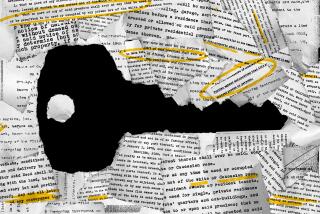Pass Laws Are Ended, But White Domination Stays
- Share via
CAPE TOWN — The South African government recently announced the abolition of the hated pass laws, the network of statutes and regulations that controlled the lives of millions of black South Africans.
Hundreds of thousands were arrested and jailed annually for pass law offenses. These laws broke up families (a man could not take his wife and children with him when he found work in the city) and made technical criminals of ordinary people looking for work. The purpose of the pass laws was to control the influx of black people to the major metropolitan areas, (which for decades were seen as part of “white South Africa”) according to government ideology, and to encourage blacks to remain in their own homeland areas, which constitute approximately 13% of the total land area.
Black influx control was seen as a basic part of the government’s overall policy of separate development, which required that different black tribal groups, and to a lesser extent the minority Asian and Colored groups, be segregated from whites to live out their political, social and (initially) economic aspirations in separate geographic areas.
The pass laws, together with other racist laws, such as the Population Registration Act (which classifies every person at birth according to race), and the Group Areas Act (which allocates urban land for residential purposes according to race), formed the legal infrastructure on which the government could pursue its policies of apartheid and separate development.
What is the significance of scrapping the pass laws? Is it cosmetic or is it really significant? No, it is not cosmetic. It is important on two levels--one abstract, the other concrete.
On the abstract level, it is yet another symptom of the government having to abandon both the ideology and goal of apartheid. This “grand plan” is bursting at the seams.
On the concrete level, abolishing the pass laws certainly alleviates hardship for many thousands of black migrant workers and their families. It is inconceivable that one could honestly be unaware of how badly these people were harassed, persecuted and demoralized by this supremely evil system of human manipulation.
Squatter communities were razed in the dead of winter, men were forced to live in degrading single quarters away from their families for 11 months of the year, whereupon they were obliged to go back to the rural areas so as not to qualify for permanent status in the urban areas.
But before one gets too flushed with excitement about “significant acts of reform” let’s pause for a moment and remind ourselves that the pass laws were but one of an armory of apartheid measures. The pass laws prohibited freedom of movement from rural to urban areas, but in the urban areas freedom of association is still prohibited in a wide range of activities.
The laws still classify people according to race, allocate them to residential areas where community facilities such as schools, welfare, transportation and housing stand out as officially created symbols of racial deprivation.
To abolish the pass laws without abolishing these other racist instruments begs the question--why the pass laws, now? Why not all other discriminatory laws? I believe it is because the government is slowly and painfully, under internal and external pressure, jettisoning apartheid measures without being prepared to accept the consequences that must flow from it--the end of white domination and the inevitability of non-racial political participation in government.
That is why each haphazard eclectic reform that the government announces is simply going to generate demands for more reform until the last vestige of institutionalized apartheid, that is white political domination, succumbs as well.
(The May 1 strike by 1.5 million blacks--the largest such work stoppage in South Africa’s history--is yet another illustration of the growing political activism of the people and their refusal to be appeased by half-way measures.)
The abolition of the pass laws obviously is a good thing. However, in the absence of other abolitions of statutory racism, it is going to mean for the short term that hundreds of thousands of blacks have greater mobility to move from rural wastelands to urban ghettos to fend for themselves.
And right now in those black urban ghettos the mood does not favor bit-by-bit uncertain reforms, but fundamental, large-scale social change; it is against this mood that the significance of abolishing the pass laws will have to be assessed as well.
More to Read
Sign up for Essential California
The most important California stories and recommendations in your inbox every morning.
You may occasionally receive promotional content from the Los Angeles Times.













